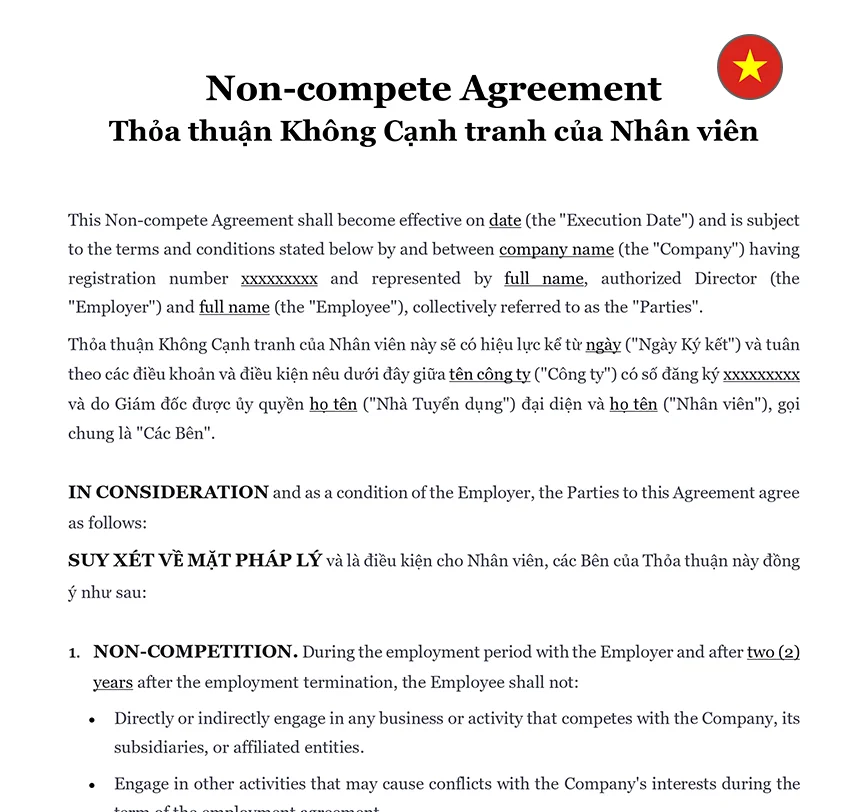Ready to use legal template
Drafted by experienced lawyers
Vietnamese-English translation
Ready to use legal template
Drafted by lawyers
Vietnamese-English translation
Learn more about Employee Non-compete Agreement in Vietnam
An Employee Non-compete Agreement is a legal document designed to protect a company’s interests by restricting employees from engaging in competitive activities after leaving their employment. It typically outlines the terms and conditions under which an employee agrees not to compete with the employer for a specified period of time and within a defined geographical area. Our Employee Non-compete Agreement template is drafted by lawyers in compliance with the law in Vietnam and is provided in an easy-to-edit Word format, ensuring convenience and legal soundness for employers and employees alike.
Table of contents
What is an Employee Non-compete Agreement?
What is included in an Employee Non-compete Agreement?
Why is it important in Vietnam?
How can employers ensure the enforceability?
What are the consequences for employees who violate it?
How does it impact an employee's ability to find a new employment?
Can an employer require all employees to sign a Non-compete Agreement?
What is an Employee Non-compete Agreement?
An Employee Non-compete Agreement is a legally binding contract between an employer and an employee that restricts the employee from engaging in competitive activities that may harm the employer’s business interests. These agreements typically outline the specific activities the employee is prohibited from engaging in, such as working for a competitor or starting a competing business, for a specified period of time and within a defined geographical area after the termination of employment. The primary purpose of these agreements is to protect the employer’s trade secrets, confidential information, and client relationships, ensuring that the employee does not use the knowledge and skills acquired during employment to benefit a competitor.
These agreements are common in industries where employees have access to sensitive information or where their departure could potentially harm the employer’s business. However, the enforceability of Non-compete Agreements varies by jurisdiction, and courts often require these agreements to be reasonable in scope and duration to be enforceable.
What is included in an Employee Non-compete Agreement?
An Employee Non-compete Agreement typically includes several key elements to define the scope and limitations of the agreement. These elements may vary depending on the specific requirements of the employer and the applicable laws in the jurisdiction, but commonly include:
Parties: Identifies the parties involved, i.e., the employer and the employee.
Effective Date: Specifies the date when the agreement becomes effective.
Definition of Competing Activities: Describes the types of activities or industries the employee is prohibited from engaging in during the non-compete period.
Non-compete Period: Specifies the duration of the non-compete agreement, typically ranging from several months to a few years after the termination of employment.
Geographical Area: Defines the geographical area where the non-compete restriction applies, which could be a specific city, region, or country.
Scope of Restriction: Clarifies the specific actions prohibited, such as working for a competitor, soliciting clients, or using confidential information for competitive purposes.
Consideration: States what the employee receives in exchange for agreeing to the non-compete, which could be continued employment, access to confidential information, or other benefits.
Confidentiality Obligations: Outlines the employee’s obligations to maintain the confidentiality of the employer’s trade secrets and other proprietary information.
Remedies for Breach: Specifies the consequences of breaching the agreement, such as monetary damages or injunctive relief.
Severability Clause: States that if any provision of the agreement is found to be invalid or unenforceable, the remaining provisions will remain in effect.
Governing Law: Specifies the jurisdiction whose laws will govern the interpretation and enforcement of the agreement.
Why is it important in Vietnam?
In Vietnam, Employee Non-compete Agreements are important for several reasons. One of the key reasons is to protect a company’s intellectual property, trade secrets, and confidential information. By restricting employees from working for competitors or starting competing businesses for a certain period after leaving their employment, companies can prevent the unauthorized use or disclosure of valuable information.
Non-compete Agreements can help maintain a competitive advantage in the market. They can prevent employees from taking knowledge, skills, and relationships built during their employment to a competitor, thereby safeguarding the company’s position in the industry.
These agreements can promote fairness and stability in the job market by ensuring that employees do not unfairly compete with their former employers immediately after leaving their jobs. This can also help foster a more secure environment for businesses to invest in employee training and development, knowing that employees are less likely to leave and immediately compete against them.
Employee Non-compete Agreements play a crucial role in protecting businesses in Vietnam from unfair competition and safeguarding their intellectual property and competitive edge in the market.
How can employers ensure the enforceability?
Employers in Vietnam can take several steps to ensure the enforceability of Employee Non-compete Agreements:
| ➤ Draft the Agreement Carefully: The agreement should be clear, specific, and reasonable in its restrictions. Vague or overly broad terms may render the agreement unenforceable. |
| ➤ Offer Consideration: Ensure that the employee receives something of value (consideration) in exchange for agreeing to the non-compete, such as continued employment, access to confidential information, or additional benefits. |
| ➤ Limit the Duration and Scope: The agreement should specify a reasonable duration for the non-compete period and limit the scope of activities and geographical area covered by the restriction. |
| ➤ Ensure Compliance with Legal Requirements: Familiarize yourself with the relevant laws and regulations governing non-compete agreements in Vietnam to ensure that your agreement complies with these requirements. |
| ➤ Review with Legal Counsel: Have the agreement reviewed by legal counsel to ensure that it complies with Vietnamese laws and is tailored to your specific business needs. |
| ➤ Provide Training and Development: Invest in training and development programs for employees to enhance their skills and knowledge, making it more likely that the non-compete agreement will be deemed reasonable and necessary to protect legitimate business interests. |
| ➤ Monitor and Enforce: Regularly monitor employees' compliance with the agreement and take appropriate legal action if a breach occurs to demonstrate the enforceability of the agreement. |
| ➤ Update as Necessary: Review and update the agreement periodically to ensure that it remains relevant and compliant with current laws and business practices. |




